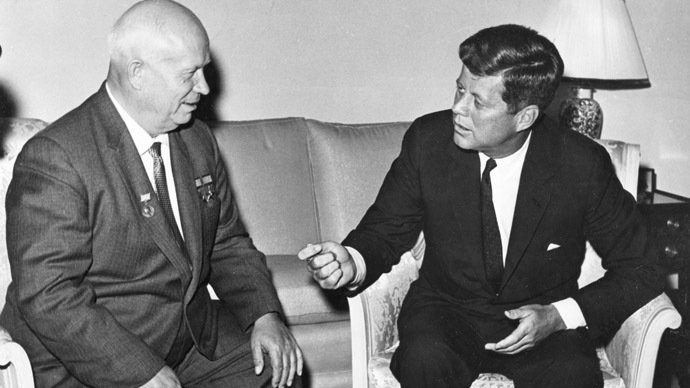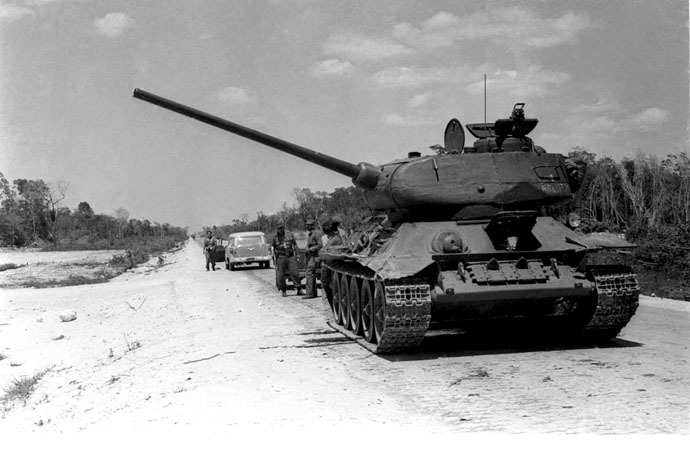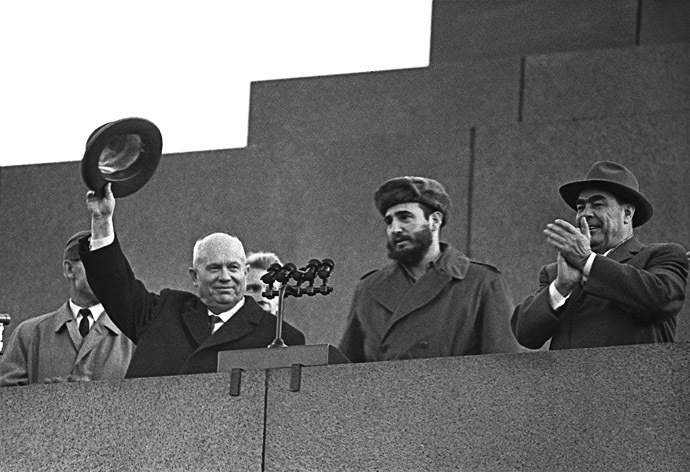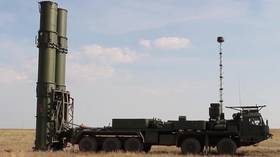From Cuban Missile Crisis to failed ‘reset’: US doesn’t learn lessons

With relations between Russia and the United States at their lowest point since the Cold War, this month marks the 52nd anniversary of the Cuban Missile Crisis, when the world moved perilously close to nuclear Armageddon.
Then, as now, the underlying reason for the breakdown in relations between East and West was US imperialism.
I remember speaking to my father about the Cuban Missile Crisis once. At the time of the crisis in October 1962, he was stationed in Cyprus with the Royal Air Force. Britain had its Vulcan nuclear bombers based there at Akrotiri, where the RAF maintains a base to this day. I remember him telling me how in those fateful days the base was put on a war footing and how everyone believed there was going to be a nuclear conflict between the Western and Eastern blocs.
The crisis unfolded between 15-28 October, after the US detected the presence of Soviet ballistic missiles on Cuba along with hundreds of Soviet technicians and thousands of military personnel. US intelligence had received information on the presence of the missiles and Soviet military personnel on the island from various sources in the days leading up. It was confirmed by surveillance pictures taken by a U-2 spy plane flying over Cuba on October 14.
The motivation commonly cited by historians when it comes to why the Soviets wanted to station missiles on Cuba was to nullify the advantage enjoyed by the US when it came to the size of its nuclear arsenal, at the time significantly larger than the Soviet Union’s, and also meeting the threat posed by US nuclear missiles based in Italy and Turkey, which gave the US a first strike capability. Meanwhile Cuba wanted the missiles to deter a future US invasion, or US-sponsored invasion, after the previous attempt to do so at the Bay of Pigs in 1961 - an event known in Cuban history as the Battle of Playa Giron – was defeated.
Conspicuously absent from the aforementioned is the desire of the Soviet Union to stand with Cuba against US aggression on the grounds of solidarity and internationalism.
In their book, ‘The Untold History of the United States’, authors Oliver Stone and Peter Kuznick explore the inner machinations of the Soviet and US governments at the time. The leaders of both countries, Nikita Khrushchev and John F Kennedy, had as much to worry about from hawks on their own side than from each other as a dangerous game of brinksmanship unfolded over the following thirteen days.

Stone/Kuznick write: “Kennedy hoped to stop the Soviets before the missiles had been fully installed. He conferred with his advisors to determine his options. On October 19, he met with the Joint Chiefs of Staff. The majority, led by Le May (Curtis Le May head of the US Air Force), favored an air strike to destroy the missiles. Le May advised, ‘The Russian bear has always been eager to stick his paw in Latin American waters. Now we’ve got him in a trap, let’s take his leg off right up to his testicles. On second thought, let’s take off his testicles, too.’”
Le May and others within the US Joint Chiefs of Staff were confident that the Soviet Union would not respond to an attack on Cuba. Kennedy was not convinced by this, flagging up the vulnerability of Berlin to a Soviet response. This possibility failed to deter Le May, however, a man for whom the only good Soviet was a dead one. On the contrary, he relished the prospect of all out military confrontation, viewing the crisis as not only an opportunity to wipe out Cuba but also the Soviet Union.
Kennedy finally decided to implement a blockade of Cuba, which he subtly described as a “quarantine” to distract from the fact that it was an act of war. His decision to do so met with undisguised disdain from the hawks within his administration, led by Le May. “This is almost as bad as the appeasement at Munich,” the air force general declared in one meeting.
Tensions grew over the following days as the stand-off continued. According to released documents of the period, the Soviets decided on October 25 to remove the missiles to avert conflict as Soviet supply ships approached Cuba and the cordon of US battleships and submarines policing the blockade. However the Soviet leadership was equally determined they would only do so if the US agreed to the quid pro quo of removing US missiles from Turkey as part of a mutual agreement.
Before the Soviet leadership could act on their decision to remove the missiles, they received intelligence, false as it turned out, that the US was seriously considering an invasion of Cuba. This resulted in a letter from Soviet Premier Nikita Khrushchev to President Kennedy on October 26, which qualifies as an example of the solidarity and internationalism which dictated Soviet policy towards Cuba, and at the same time the hypocrisy of Washington. The letter reads in part:
“If you are really concerned about the peace and welfare of your people and this is your responsibility as President, then I, as the Chairman of the Council of Ministers, am concerned for my people. Moreover, the preservation of world peace should be our joint concern, since if, under contemporary conditions, war should break out, it would be a war not only between the reciprocal claims, but a worldwide cruel and destructive war.
Why have we proceeded to assist Cuba with military and economic aid? The answer is: We have proceeded to do so only for reasons of humanitarianism. At one time, our people itself had a revolution, when Russia was still a backward country. We were attacked then. We were the target of attack by many countries. The USA participated in that adventure. This has been recorded by participants in the aggression against our country. A whole book has been written about this by General Graves, who, at that time, commanded the US Expeditionary Corps. Graves called it ‘The American Adventure in Siberia.’
We know how difficult it is to accomplish a revolution and how difficult it is to reconstruct a country on new foundations. We sincerely sympathize with Cuba and the Cuban people, but we are not interfering in questions of domestic structure, we are not interfering in their affairs. The Soviet Union desires to help the Cubans build their life as they themselves wish and that others should not hinder them.
You once said that the United States was not preparing an invasion. But you also declared that you sympathized with the Cuban counter-revolutionary emigrants, that you support them and would help them to realize their plans against the present Government of Cuba. It is also not a secret to anyone that the threat of armed attack, aggression, has constantly hung, and continues to hang over Cuba. It was only this which impelled us to respond to the request of the Cuban Government to furnish it aid for the strengthening of the defensive capacity of this country.”

The key factor responsible for the Cuban Missile Crisis was a belief which poisoned the thinking of the US ruling elite, and which continues to poison it to this day, that Latin America was their property, available to be exploited for the gain of US corporations at the expense of its people and their rights of national sovereignty. This sense of entitlement, steeped in racism, was enshrined in the Monroe Doctrine of 1823. The Cuban Revolution of 1959 was significant precisely because it symbolized the assertion of the right of the people of Latin America to forge their own path, free of the yoke of Washington. As such, it marked a dangerous precedent in the eyes of the US, one that has informed its decades-long attempt to undermine, terrorize, and starve the Cuban Revolution out of existence ever since.
When the crisis finally ended peacefully the entire world heaved a sigh of relief. There was anger on the part of the Cuban leadership towards its Soviet ally over the lack of consultation and input when it came to the decision to remove the missiles. In particular, Fidel Castro was angry that the status of Guantanamo Bay was not included as part of the agreement to end the crisis. Guantanamo has remained occupied by the United States ever since.
The Soviet leadership did, however, manage to secure a pledge from the administration not to invade Cuba, in addition to the withdrawal of US Jupiter missiles from Turkey a few months later – though as part of the deal the Soviet Union agreed to keep it quiet, so as to spare the Kennedy administration criticism from hawks within its own ranks and the US media.
The best summing up of the crisis after it ended came from Soviet Premier Nikita Khrushchev, who said: “They talk about who won and who lost. Human reason won. Mankind won.”
With chaos and conflict raging across the globe as these words are being written, as then so today we are still living in a world suffering due to the lack of democracy not so much “within” states as “between” states.
The statements, views and opinions expressed in this column are solely those of the author and do not necessarily represent those of RT.
The statements, views and opinions expressed in this column are solely those of the author and do not necessarily represent those of RT.













